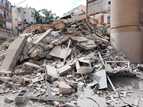weekly column
|
Each week, find a commentary on something connected to verses of Torah or another source of wisdom
|
|
Each week, find a commentary on something connected to verses of Torah or another source of wisdom
|
 Wisdom Wherever You Find It May your homes not become your graves. High Holy Day prayerbook In the liturgy for the afternoon of Yom Kippur is a recollection of the long-ago service of atonement in the Holy Temple. At the end of the description of the sacrificial rituals is a tiny addition. The High Priest says to the pilgrims who have gathered from the Sharon Valley on the coastal plain, “May your homes not become your graves.” That section of the Holy Land is subject to earthquakes, and when they occurred the stone structures in which people lived could collapse without notice. In the liturgy, the prayer is just that brief, but even thousands of years later, thousands of miles away, hundreds of thousands of days since the last catastrophic earthquake, I am always captured by the poignancy of what feels like a spiritual afterthought. Of late, the prayer feels more immediate. The rash of violent natural occurrences that have produced unusual and ferocious tornados, volcanos and tsunamis, deluges, fires, and earthquakes each produces photos of the aftermath in which our homes have become our graves. There is barely a week that goes by in which multiple people do not lose their lives in collapse, explosion, fire, or asphyxiation in private or public housing, making our homes become our graves. The global reach of daily news brings constant shock over the homicides and suicides – most often by gunshot – of entire families, turning our homes into our graves. There is always an element of complicity in these tragedies by human hands – the ones that hold the firearms, the ones that do not maintain the housing, the ones have contributed to climate change. The prayer has a much larger metaphoric resonance as well. Eastern Europe was home to millions and millions of Jews (and other minorities) in the early 20th Century. Our homes became our graves. My goal is not to depress you, though I have probably succeeded, nonetheless. My goal is to illustrate how easily the specter of death can overwhelm the heart that needs to grieve and remember other hearts. Late last year, I lost a dear, dear lifetime friend who succumbed to a phalanx of health challenges that finally dominated a heretofore indominable spirit. As her family grieved, death paid another visit to her mother who was, no doubt, made more fragile by the death of her beloved child. Unbelievably, during the funeral for the mother, her mother-in-law died. The husband, my soul-friend, was bereaved three times in two months. No place he could lay his head was untouched by death. I am no longer the rabbi of a congregation. I like to say I am out of the retail end of the business, but old reflexes can come back pretty quickly. I was distressed for the family and for myself (almost a part of the family) that the circumstances had conspired to replace grief for each loved one with a sort of death-fatigue. Compassion for the survivors is important after any loss, but it is no less important than the respect that the distinct memories of the deceased demand. Three genuinely remarkable women had died so close to each other, and our natural inclination was to push against death, not to grieve the uniqueness of each. That’s the danger of that painful prayer: may your homes not become your graves. Of course we pray for that. Of course it is appropriate. Of course we do not want to conflate the place we live with the place we die. But the death of another is not our own death. It does not matter the cause – the Holocaust, the covid virus, the hurricane, the assault weapons. The life that death has claimed deserves our grief in a way that does not allow our fear of death itself to claim that life a second time. Death will successfully stalk each one of us, God willing for 120 years. And when we die, as we must, we deserved to be mourned uniquely, whatever form that takes. May our homes not become our graves. May death claim those we love only once.
0 Comments
Leave a Reply. |
Archives
October 2023
Categories |